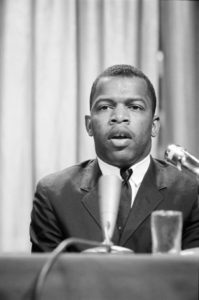“Humanity is the most important endangered species under threat from climate change and yet we flood our ecology with poisons and pollution. It is my belief that our country needs better environmental protections and that real protections do not have to come at the expense of jobs or our economy. Whatever we do to the earth, we do to each other.”
-Congressmen John Lewis (1940-2020)
In these unprecedented times, I have felt hope, inspiration, and gratitude in reflecting upon the life and work of Congressmen John Lewis since his passing earlier this month. From feeling chills up my spine while watching him speak as the youngest activist on stage at the 1963 March on Washington, to tears on my face in listening Barack Obama award him the Presidential Medal of Freedom in 2011, I am rejuvenated by his determination and drive to demand a more just world for all—and not in the future, but right now.
Studying the history and tenants of environmental justice as an undergraduate and graduate student, the inseparable links of systemic racism and environmental and climate injustice solidified in my young mind. It became impossible to think about clean water and air and environmental safety and toxic waste without mentioning the communities of color being targeted and poisoned.
The Environmental Justice movement has always credited the Civil Rights Movement with building a strong foundation in community strength and collective organizing to promote justice, equity and the end of institutional discrimination. For Congressmen John Lewis, and many other civil rights activists, environmental racism and climate concerns were always a larger question of equity and justice.
It’s only natural, then, that in addition to his tremendous work with the Civil Rights Act of 1964 and Voting Rights Act of 1965, Lewis later introduced the Environmental Justice Act of 1992, which eventually led to Executive Order 12898, issued by Bill Clinton in 1994. This Order mandates that federal government consider heath environmental impacts on minority and low-income populations in its decisions, and it has continued to serve as a legal backbone for the movement. In 2014, the EPA honored Lewis as an Environmental Justice Champion.
Educating myself on Lewis’ legacy in the past few weeks, my understanding of the deep connection between environmental and social justice issues has deepened, and my conception of what that means right now—from supporting the Black Lives Matter movement, to demanding protection of supposedly protected land along the proposed Border Wall—is tangible. I will keep Lewis’ words in mind:
“Though I may not be here with you, I urge you to answer the highest calling of your heart and stand up for what you truly believe.”
Thank you, Congressmen John Lewis. I will strive to honor your legacy in my daily work. May you rest in peace.
Recommended Viewing & Reading:
John Lewis’ Pivotal “This Is It” Moment at the March on Washington in 1963


